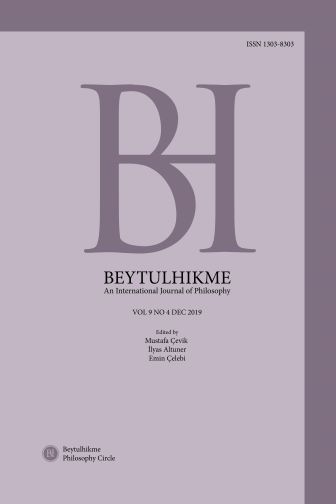Epistemological Layers: Analysis of Changes in Cultural Paradigms on the Example of the Mid-18th Century European Culture
Author :
Abstract
Bu çalışmadan önce yazar, tüm biliş alanlarında değerlerdeki genel değişim eğilimlerini ve baskın fikirleri tanımlamakla görevlendirildi. Çalışma sırasında bir dönem ve bir uygarlık alanının farklı bilgi dalları karşılaştırılmıştır. Yazar, içlerindeki gelişmiş eğilimleri analiz etmektedir. O, 18. yüzyıl ortalarında Avrupa kültürü örneğini seçmektedir. Makale, felsefe, ekonomi, dilbilim ve doğa bilimlerinin bilimsel paradigmalarındaki değişiklikleri ele almaktadır. Dolayısıyla, bilimsel bilginin tüm alanlarında, doğaya ilgi eğilimi vardır. Özellikle felsefede, insanın doğal durumunun değeri Rousseau'yu "insan doğasına önder" olarak savundu, bu dönemin ekonomisinde, fizyokrat okulun kurucuları Quesnay ve Turgot'a önemli bir katkı var. Sermaye kavramını değiştiren ve doğanın değerini gösteren dilbilimciler Dumarsais, de Condillac ve Gebelin, dil öğreniminde yani doğal dillere olan ilgiyle önemli bir atılım gerçekleştirdi. Doğa bilimlerinde, bilim adamları ayrıca doğayı aktif olarak inceledi; özellikle, Lavoisier'in yanma teorisinin keşfine ve Linnaeus'un hayvan ve bitki sınıflandırmasının yeniden tanımlanmasına atıfta bulunmaktadır.
Keywords
Abstract
Before this study, the author was tasked with identifying general tendencies of changes in values and dominant ideas in all spheres of cognition. During the study different branches of knowledge of one period and one civilization area are compared. The author analyzes the tendencies developed in them. He chooses the example of the mid-18th century European culture. The article considers changes in scientific paradigms of philosophy, economics, linguistics, and natural sciences. Thus, in all areas of scientific knowledge, there is a tendency of interest in nature. In particular, in the philosophy, the idea of the value of the man’s natural state advocated Rousseau in his "ode to human nature," in the economics of this period, a significant contribution belongs to Quesnay and Turgot, the founders of the physiocratic school, who changed the concept of capital and showed the value of nature. Linguists Dumarsais, de Condillac and de Gebelin made a significant breakthrough in language learning, namely by the interest in natural languages. In the natural sciences, scientists also actively studied nature; in particular, it refers to the discovery of the Lavoisier’s theory of combustion, and the redefinition of the Linnaeus’s classification of animals and plants.
Keywords
- Alighieri, D. (1990). De Vulgari Eloquentia. Lincoln: University of Nebraska Press.
- Aquinas, T. (2000). Dokazatelstva bytiia Boha v “Summe protiv yazychnikov” i “Summe teolohii”. Moskva: IF RAN.
- Baczko, B. (1970). Rousseau: Einsamkeit und Gemeinschaft. Wien, Frankfurt, Zürich: Europa Verlag.
- Chomsky, N. (2000). Rozdumy Pro Movu. Lviv: Initsiatyva.
- Dumarsais, C. C. (2010). Logique et Principes de Grammaire, 1769. Kessinger Pub- liching.
- Loschyna L. & Podliesna V. & Tkachenko I. (Eds.) (2009) Istoriia Ekonomiky ta Ekonomichnoi Dumky: Kurs Lektsii. Sumy: DVNZ “UABS NBU”.
- Quesnay, F. (2005). Tableau Économique. Œuvres Économiques Complètes et Autres Textes. T. 1. Paris: À l’Institut National d’Études Démographiques.
- Runggaldier, E. (2014). Die Eine Philosophie und die Vielen Philosophen. Korres- pondenzblatt des Canisianums. Heft 1, Jahrgang 147. Innsbruck: Collegium Canisianum.
- Smotrytskyi, M. (1979). Hramatyka. Kyiv: Naukova Dumka.
- Stepanenko, S. & Antoniuk, C. & Feshchenko, B. & Tymochko, N. (Eds.) (2010). Istoriia Ekonomiky ta Ekonomichnoi Dumky: Navchalnyi Posibnyk. Kyiv: KNEU.
- Zyzanii, L. (1980). Hramatyka Slovenska, 1596. Kyiv: Naukova dumka. Öz: Bu çalışmadan önce yazar, tüm biliş alanlarında değerlerdeki genel değişim eğilimlerini ve baskın fikirleri tanımlamakla görevlendirildi. Çalışma sırasında bir dönem ve bir uygarlık alanının farklı bilgi dalları karşılaştırılmıştır. Yazar, içlerindeki gelişmiş eğilimleri analiz etmektedir. O, 18. yüzyıl ortalarında Avrupa kültürü örneğini seçmektedir. Makale, felsefe, ekonomi, dilbilim ve doğa bilimlerinin bilimsel paradigmalarındaki değişiklikleri ele almaktadır. Dolayısıyla, bi- limsel bilginin tüm alanlarında, doğaya ilgi eğilimi vardır. Özellikle felsefede, insanın doğal durumunun değeri Rousseau'yu "insan doğasına önder" olarak savundu, bu dönemin ekonomisinde, fizyokrat okulun kurucuları Quesnay ve Turgot'a önemli bir katkı var. Sermaye kavramını değiştiren ve doğanın değerini gösteren dilbilimciler Dumarsais, de Condillac ve Gebelin, dil öğreniminde yani doğal dillere olan ilgiyle önemli bir atılım gerçekleştirdi. Doğa bilimlerinde, bilim adamları ayrıca doğayı aktif olarak inceledi; özellikle, Lavoisier'in yanma teorisinin keşfine ve Linnaeus'un hayvan ve bitki sınıflandırmasının yeniden tanımlanmasına atıfta bulunmaktadır. Anahtar Kelimeler: Biliş, epistemolojik katman, paradigma, bilimsel devrim, doğa.





